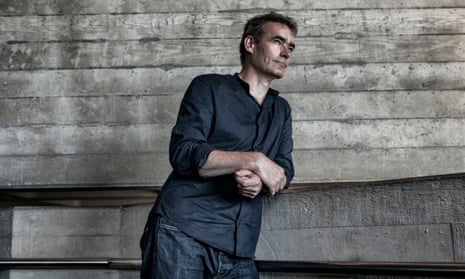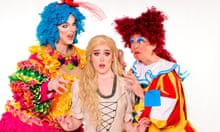The National Theatre reopened then closed again this week for lockdown. It must have been good to have audiences back, albeit briefly, for Death of England: Delroy?
It’s been another drop down on the rollercoaster of this whole period. I gave a little speech at the beginning of the show about how it’s fantastic to feel audiences’ hunger for gathering together to hear a story. It’s been very uplifting. This has been a difficult, painful period and the best balm for all the anxiety is to get up and do what we’re here to do. And we’ve got that show now – it will have a life at some stage.
You even managed to film the production during its short run.
The popularity of NT at Home affirmed the importance of that. We had planned on filming it later but when we got the lockdown news on Saturday, within half an hour we got on Zoom and said let’s bring forward the filming. Now we’re talking about the most effective way to get it out to as wide an audience as we can.
What other plans does the NT have over this month of lockdown?
It’s radically different from last time. We’ve got a space that’s ready to go and we know what the shows are that we want to do. We’re hoping lockdown will be lifted at least for a time over Christmas so that the panto that’s in rehearsal [Dick Whittington] can take place. If by any chance the lockdown continues, then we’ll capture it and do something with that recording. The other thing that’s in rehearsal is Romeo and Juliet, which is a film.

Will the Romeo and Juliet film look similar to an NT Live production?
It’s completely different. The Lyttelton stage is very big and has the same space behind it and at the sides. What that means is if we clear everything out we have a very big space that, to all intents and purposes, can be turned into a film studio. We’re making a film, not capturing a play. It’s very much a new form that we’re discovering by the day. The director, Simon Godwin, is rehearsing it as a cross between how you’d rehearse a play and how you’d rehearse a film. Normally in film-making you don’t get that much rehearsal time, but in this case we’ve got the opportunity to do that … We’ve got a top director of photography, a script supervisor, a gaffer, a grip and a certain amount of film expertise alongside all the theatre staff. It’s a very interesting meeting point. It’s great to be breaking a bit of new ground.
In the spring, you said the National was haemorrhaging money. How do the organisation’s finances look now?
In the near term, the absolutely crucial thing is the result of our loan application [as part of the government’s £1.5bn arts rescue fund]. We think we’ll know about that by the middle of the month. If, by any chance, we don’t get that loan we’re in an unthinkable ballpark. If we get close to what we’ve asked for then we’re relatively confident that we can find our way through the next few months. It will stop the haemorrhaging. It’s a loan not a grant – it’s money we have to pay back. So it’s a tricky balance. We don’t want to ask for too much. As it is, Lisa Burger [executive director of the NT] and I are uneasy about saddling whoever is leading this building in 10 or 12 years’ time with those payments. As an organisation, if we get that vote of confidence from the recovery fund, that’s what a lot of our donors are looking for. They want to see that the money they’re putting into charities is not going down the drain. It’s quite a complex picture.

Over the course of this year, do you think the government has gained a clearer idea about the UK theatre ecology?
Absolutely. At the beginning we got a loud and clear message from DCMS that as an industry we had to talk in one voice. At first we were like, well, we’ve got subsidised, not for profit, touring companies, commercial, the difference between Slung Low and the National, Sonia Friedman and Bristol Old Vic and English Touring Theatre. How can we possibly talk in one voice? They said you’ve got to learn and we did. The communication within the broader industry is so much better than it ever has been. The lobbying might have appeared haphazard but it was much less so than it looked, and it resulted in a very positive recovery fund – not for freelancers but for organisations. I would hope in the long term that that cohesion will stay. It’s useful to be reminded that we’re all interdependent – we’re all in the same game.
You must worry about talent draining away from the industry during this crisis.
We are entirely dependent on the 70% of the workforce that are freelance and they are out in the cold to a huge degree. What is of great concern is that this will exacerbate the already existing inequality between people who have the wherewithal to survive lean periods, because they have support from elsewhere or have had opportunities when they were younger [and those who don’t]. I’m talking about class and diversity. There have been significant advances, hard fought for, over the last few years and we’re already seeing that going backwards very quickly. An expansion of the criteria around the self-employment income support scheme and freelance support is essential. I’d love to see a reset of that to recognise the long-term impact.









Comments (…)
Sign in or create your Guardian account to join the discussion